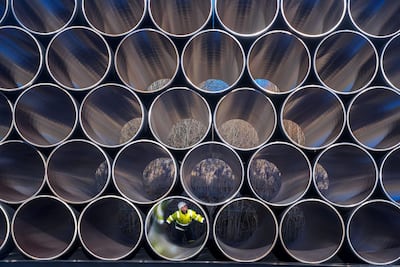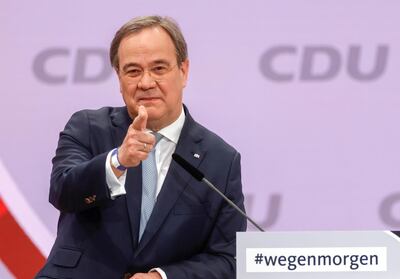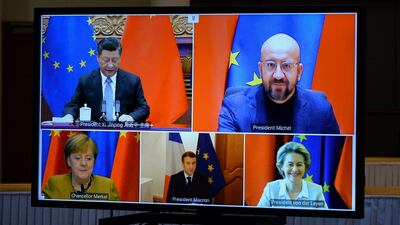Is the world of international affairs a matter of black and white, in which the forces of good do constant battle with the legions of evil, and in which all must take sides?
One might imagine that it is, judging by the way the EU has been attacked following the recent finalisation of its Comprehensive Agreement on Investment (CAI) with China. Soon after the trade deal was announced, more than 100 politicians and activists wrote an open letter demanding that the EU withdraw, complaining that the CAI was "based on a naive set of assumptions about the character of the Chinese Communist Party" and "runs counter to Europe's core values".
Others have variously described it as “a disaster for the West”, a “missed opportunity” to push harder on human rights issues, and an accord that “will poison transatlantic relations” because of US President Joe Biden’s wish for America and Europe to act in concert when dealing with Beijing.

But it's not just China. The EU has also been condemned for not backing criticism of Russia over the country's lack of liberties with stronger action, with Berlin in particular attracting considerable flak for continuing with the Nord Stream 2 natural gas pipeline between the two countries. When Armin Laschet, the new leader of Germany's ruling Christian Democrats, said that the jailing of Kremlin critic Alexei Navalny was no reason to stop the pipeline, Jonathan Eyal, International Director at the Royal United Services Institute in London, tweeted "the would-be German chancellor is a man who stands up for his values. Gazprom values", referring to the Russian energy company.
European leaders have defended their independence and their refusal to take part in a face-off between the US and China. "I believe it is very important for the EU to have its own China policy," current Chancellor Angela Merkel said a few days ago. "We should strengthen multilateralism. I don't think de-coupling is the right way to go."
France's President Emmanuel Macron has also rejected an alliance ganging up on Beijing, calling it a "scenario of the highest possible conflictuality" and "counterproductive". As for Russia, the CDU's Mr Laschet asked why his country should opt for drastic action over the plight of Mr Navalny when, as he said: "For 50 years, even in the aggressive times of the Cold War, Germany has bought gas from the Soviet Union, now from Russia." "Feel-good moralising," he added, was not foreign policy.
Mr Laschet makes a good point. But as the Georgetown professor Anatol Lieven put it in a recent article in Prospect magazine: "The approach that is building up in Washington risks repeating some of the worst US mistakes of the Cold War: the demonisation of the enemy; the inflation of the adversary's strength; the exaggeration of the adversary's ambitions" – here he cites as a counterexample what he describes as China's "notably cautious and hesitant" strategy in the Middle East – and "the framing of every local dispute as part of a global struggle between good and evil".
And it's not just in Washington. The Biden administration's early emphasis on democracy, rights and values has added impetus, but the view that under their current leaderships both China and Russia are malign actors has been hardening among a substantial body of politicians, particularly in the US and the UK, for some time. More than ever, they are giving the impression that all aspects of the relationships with those two countries – not just trade – must be measured by the yardstick of human rights and values.
First of all, it should be obvious that “values” – beyond some very basic ones – vary from place to place. Countries that are not liberal democracies, such as China and Russia, are clearly guided by a different set of values. The logic of this new test by the West dictates that they are therefore automatically cast in the wrong.
Second, why has this suddenly become the over-arching criterion – one of which we heard little during the many decades when the West would support more or less any dictator, no matter how corrupt or barbarous, so long as he was not a communist?
It is not the criterion of the EU, which has described China as “a co-operation partner with whom the EU has closely aligned objectives, a negotiating partner, with whom the EU needs to find a balance of interests, an economic competitor in pursuit of technological leadership and a systemic rival promoting alternative models of governance".
This aligns with the positions of Ms Merkel, who mentions climate change as a key area for the EU and China to work together, and Mr Macron, who says China is at once a partner in some areas, a competitor in others, and a strategic rival in terms of values.

This is more sensible, more realistic, and more in tune with the traditional goal of foreign policy, which is not the desire to establish your ideals or "values" elsewhere but the pursuit of national self-interest. For Germany, with China as its biggest trading partner, that certainly makes sense. As more widely did a comment by the country's economy minister, Peter Altmaier: "Business relationships and business projects that have existed for decades are one thing, and serious human rights violations and our reactions to them are another." He was referring to Russia but his words apply just as well to China.
I am not defending the governments in either China or Russia, nor would I wish to live under the systems of government that pertain in these two countries. But there is no "containing" either China or Russia, nor should we talk in those terms. And if the West wants to make everything about human rights, it had better be prepared for the UK to be sanctioned for its terrible treatment of immigrants from the Caribbean, and for the US eventually to be prosecuted for war crimes in an international court.
It is better to take the EU’s approach and avoid seeing relations between countries today as a “global struggle between good and evil”. Let’s leave the last word to Germany’s Mr Laschet: "We have to take the world as it is in order to make it better."
Sholto Byrnes is an East Asian affairs columnist for The National


















